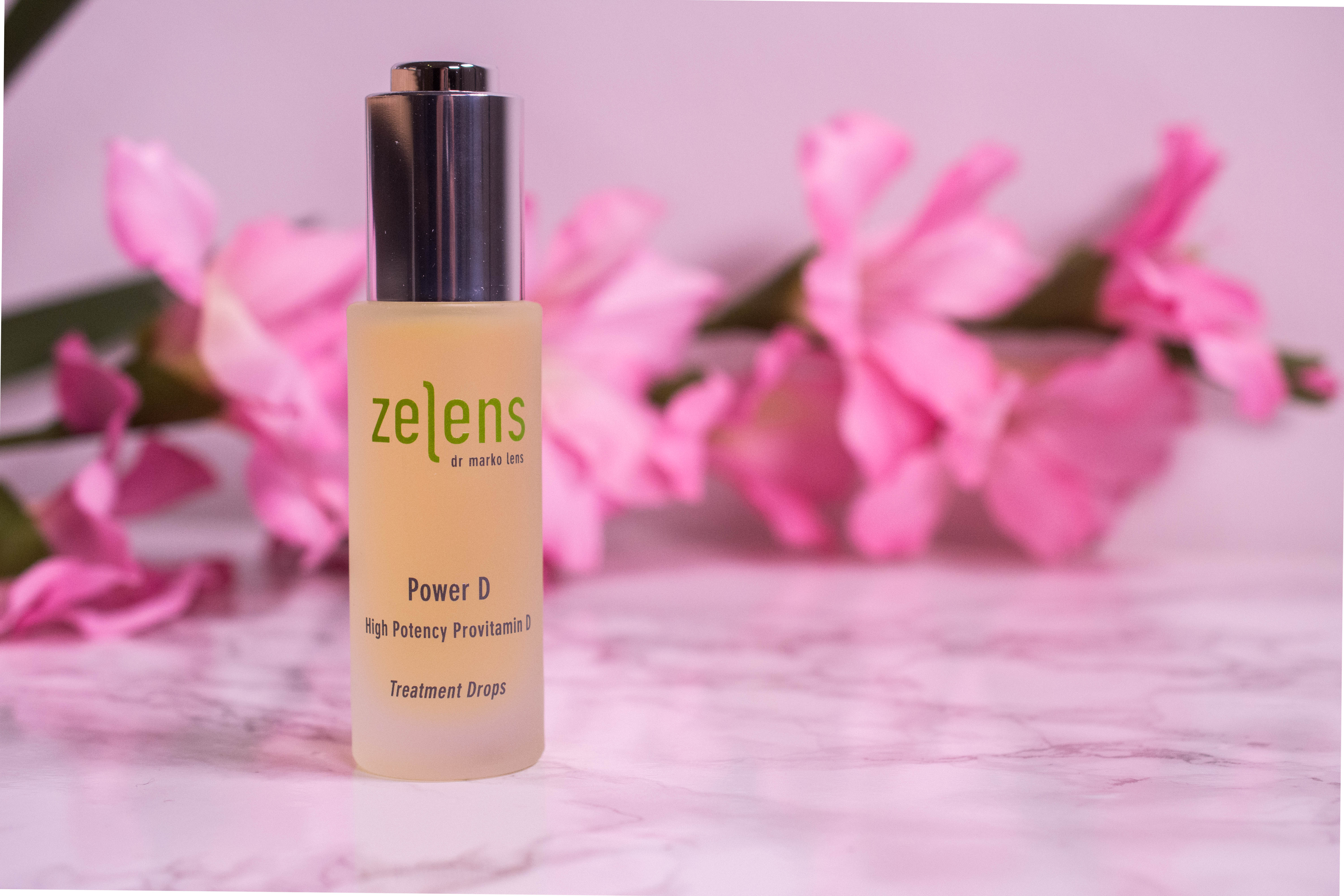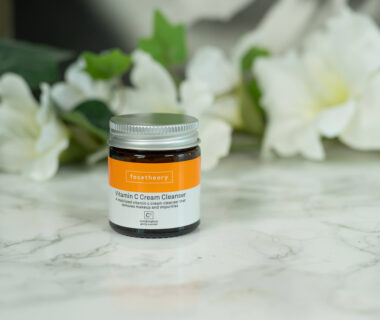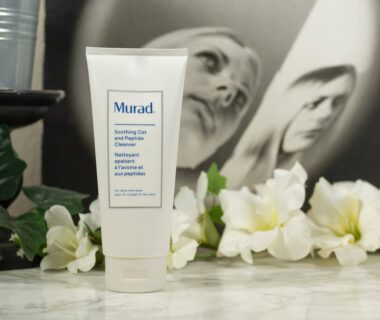Advertisement info: This blog post uses affiliate links. I received no money to write it. Please read disclaimer.
They say the best blog posts are those that come straight from the heart. Well, this one doesn´t. But it does come from my damaged skin barrier, and I think in this case that is even better.
You see, I know that I test a lot of different products. I also know that testing a lot of different products is a sure way to damage my skin barrier. So I am extra careful with what I test, when I test it and what I test it together with. Extra, extra careful. There is an Excel spreadsheet, Google Calendar reminders and bi-monthly planning involved.

I also suffer from a mild form of atopic dermatitis, so I always knew that if I weren´t extra, extra careful, things would get ugly quickly.
Well, a few weeks ago, they did.
It started with an atopic dermatitis flareup on my chest and upper arms, probably caused by the cold, hot showers and stress. When the flare up reached my neck, it would have been the perfect time to cut back on my actives and focus on strengthening my skins barrier. Would have. Of course I didn´t.
Why? Don´t ask me. I wanted to stick to my schedule I guess. I ignored the warning signs of a damaged skin barrier (more on that below), doubled my workload with a few exciting new projects and spend a week mainly outdoors in the mountains, cold wind and snow included.
The results weren´t pretty. I had the worst flare up ever, with eczema patches spreading all over my hairline, cheeks and eyes. Which reminded me (trying to see the bright side here), that I had been meaning to talk about a damaged skin barrier for a while now.
What is the skin barrier?
Before we talk about damaging it, we should probably talk about what it is. The skin barrier goes by many names: Lipid barrier, moisture barrier or, the most technical term, stratum corneum. The stratum corneum is the outermost layer of the epidermis, consisting of 15 -20 layers of dead cells. These dead skin cells are embedded in a lipid matrix composed of ceramides (60%), cholesterol, and fatty acids.
The function of the stratum corneum is to form a barrier to protect the underlying tissue from infection, dehydration, irritants and mechanical stress.
Or, to put it more simple: Good stuff stays in, bad stuff stays out.
On top of that, skin has a mildly acidic pH, which also adds to the barrier function in helping enzymes in the stratum corneum function properly.
In summary: The skin barrier is a physical, chemical and enzymatic system designed to protect our skin.

What does damage the skin barrier?
Everything we do.
There are environmental factors, like the sun, the wind and cold and dry air. There are lifestyle factors, like alcohol, smoking, medication we need to take and stress (Cortisol, the hormone that is released when we experience negative stress, increases inflammation in the skin).
Another thing that plays a role is our age, as the amount of ceramides in the skin decreases with each passing year, and of course certain innate conditions, like Atopic Dermatitis, Rosacea and even acne that come with a weakened skins barrier.
One of the biggest factors though are our habits, like…
- Overwashing: Washing your face with too hot or too cold water, or bathing for too long, as it strips the lipids from the skin
- Our cleansers: Alkaline cleansers change the pH, harsh/ stripping cleansers (the ones that leave your skin feeling tight/squeaky clean) and overcleansing in general will strip your natural oils and damage the skins barrier (I have a dedicated blog post on the topic of Double Cleansing here)
- Overexfoliation: We all exfoliate way more than we think: Microfibre cloths, towels, cleansing brushes, all is physical exfoliation. Pair that with (daily) use of chemicals exfoliants, no matter how gentle, and you will strip your skin from the protective layer of dead skin that, as we learned above, actually has a purpose.
- Our actives: While beneficial for our skin, all of them have irritating potential. Think Vitamin C, Retinoids, Benzoylperoxide, AHA/BHA… Used too often and in conjunction, they can slowly damage the skins barrier over time.
- No moisturizer: A product with emollients and occlusive is key to keeping the skins barrier healthy, so skipping these products because you have acne and learned long ago that they don’t sit well on your skin is detrimental. These days many amazing products for different skin types are available.
What does a damaged skin barrier feel like?
You do have a skin type that is genetic (but might change over the years), and you have skin conditions. While the strength of the skin barrier is partly genetic, changes in skin conditions tend to tell you that you damaged your skin barrier.
Warning signs are if your skin:
- Gets really oily, but is dehydrated at the same time
- Develops product resistant dry patches, flakiness and/ or eczema
- Breakouts that don´t seem to heal or pop up in very strange places where you usually don´t get them
- Redness and inflammation
- Sudden sensitivity, like stinging or itching of your skin when using products that were previously fine
Why is a damaged skin barrier problematic?
We talked about the function before: Good things stay in, bad things stay out. If that doesn´t work anymore, it means that:
- Good things go out, aka water evaporates big time. The Transepidermal Water Loss (TEWL) increases and your skin is dehydrated, dull and prone to fine lines and wrinkles.
- Bad things get in. Bacteria enters the skin and causes inflammation (and subsequently premature aging), breakouts and acne. Irritants like essential oils or fragrance can enter, which increases the risk of developing sensitivities.
Important to note: The essential oils/fragrance does NOT cause the damaged skin barrier. But these substances combined with a damaged barrier increase the risk of developing allergies.
But even without knowing the things above: Your skin will feel awful – that should be reason enough to change something.

Skin barrier repair – How do you do it?
As always, prevention is key. Don´t damage your skin barrier in the first place. And to achieve that, keep a simple routine, don´t overexfoliate/ overcleanse and assess which actives you really need. Yes, you can combine daily retinol with a daily chemical exfoliation, a cleansing brush and a Vitamin C. But do you really need to?
Look at your lifestyle. Is your nutrition balanced and rich in foods including Omega 3 and 6 Fatty Acids? Do you have a proper form of stress management in place? Do you get enough sleep?
And I am not even talking about smoking, drinking and not wearing sunscreen here! These should be given.
If you feel like your skin barrier is already damaged, you´ll need to approach it with a plan:
- Stop the actives until your skin is recovered. The time that takes might vary, depending how severely you damaged your skins barrier, but I´d recommend at least a week. And yes, any Vitamin C with more than 5 % does count.
- Make sure you have a gentle cleanser and you don´t overcleanse.
- Stop using potential irritants like essential oils and fragrance as well as anything you know you are allergic to. Again, not because they cause the damage but because you are more prone to develop sensitivities.
- Replenish the missing parts of the skins barrier. The skin cells will grow back once you stop exfoliating, and for the lipid barrier look for a product that contains ceramides/cholesterol and or free (essential) fatty acids. Examples are creams called barrier cream, barrier repair cream or barrier maintenance cream (I will link a few product recommendations below).
- Other ingredients to look for are Niacinamide, which helps with barrier restore and calms the redness (find my favorite reviewed here), and Provitamin B 5 to soothe and repair.
- Urea and even Lactic Acid, despite being technically acids, can be helpful too if your skins pH is too alkaline, as they help acidify the skin and act as humectants.
- Once your skin feels better, SLOWLY reintroduce the actives you REALLY need into your routine. Step by step. It is a marathon, not a sprint.
It took me around a week to get my skin back on track, and I am still in the process of slowly reintroducing actives back into my routine. But you know what? My skin feels (and looks) better than it has in a long time. Maybe the eczema flare up was just what I needed to give me a nudge in the right direction…

Products that might help with skin barrier repair


